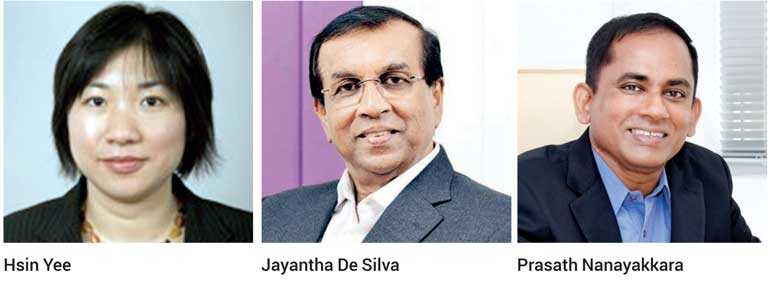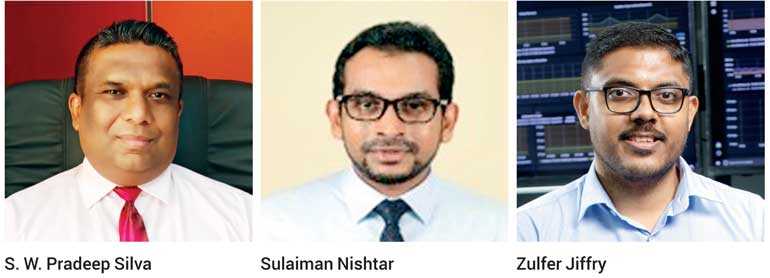Thursday Feb 26, 2026
Thursday Feb 26, 2026
Tuesday, 1 December 2020 00:56 - - {{hitsCtrl.values.hits}}


A webinar held by the Chartered Institute of Management Accountants (CIMA) recently discussed digital taxation, its challenges and benefits.
An elite panel of industry professionals; Ernst & Young – Singapore Partner – International Tax and Transaction Services Hsin Yee Wong, Information and Communication Technology Agency (ICTA) Chairman Jayantha De Silva, Department of Inland Revenue Commissioner – Large Taxpayer Services Unit and Sri Lanka Institute of Taxation Member S.W. Pradeep Yasantha, Digital Mobility Solutions Lanka Ltd. CEO Jiffry Zulfer, and Million Spaces Ltd. Chairman and CEO Prasath Nanayakkara took part in the dialogue which was moderated by Ernst & Young Partner – Tax Sulaiman Nishtar, ACMA, CGMA.
Taxing a digital economy – how?
Hsin Yee, key speaker at the event, said that while the digital economy allowed companies to operate in any country without a physical presence, this gives rise to tax controversy. In the modern business landscape, digital players could earn revenue from different countries without ever having to set up an entity or having a presence in the local country, creating complexity in taxation.
This has become an issue for tax administrations around the world, which Hsin Yee says has resulted in the Organisation for Economic Co-operation and Development (OECD) making efforts to reach a global consensus as to how this issue can be dealt with.
She spoke of OECD’s Base Erosion and Profit Sharing Action Plans (BEPS Action Plan), first introduced in 2013, which aimed to gather tax administrators from across the globe to come up with new tax rules or update prevailing rules in the best way possible to counter what tax administrators view as aggressive tax planning that exploit mismatches in tax rules, of which Action Plan 1 is on addressing the tax challenges of the digital economy.
Fast-forwarding to 2020, Hsin Yee says the OECD has now progressed to what tax professionals term ‘BEPS 2.0’, where the OECD are proposing two pillars to address the issue of taxing the digital economy. Pillar 1 addresses taxing rights and nexus rules, while Pillar 2 suggests global minimum tax rules. However Hsin Yee also commented that as of October 2020, the deadline to reach global consensus (previously December 2020) has now been pushed to June 2021.
Progressive countries have found different methods of taxing
According to Hsin Yee, not all countries have waited for consensus to tax digital players. She mentions various forms of unilateral action that have already been taken. The most prominent method is the Digital Service Tax which was first introduced by the EU in 2018.
The DST is a tax on turnover and is imposed at a certain percentage of local revenue if a business crosses a global turnover threshold as well as either a local turnover threshold or a number of local customers threshold.
Other countries have chosen a different route, making non-resident suppliers of digital goods and services register and impose VAT or GST on sale to local customers. Lastly, some countries landed on a middle point between the mentioned actions – digital taxes – which is often a hybrid between VAT/GST and DST.
The type of taxes introduced vary between countries as they decide on a more individualistic form of action. She also spoke of Digital Permanent Establishment referred to as Digital P.E. This form of action comes into play if a company makes sales past a certain threshold or reaches a certain number of consumers in that particular country which deems the company as a permanent establishment due to it having a significant economic presence in that country.
Outlining businesses that can be held liable, Hsin Yee pointed to subscription-based media, downloadable digital content, advertising services, online trading, support services, software programs, electronic data and management and supply of search engine and automated help desk services as types of digital services that are subject to digital taxation. Different countries have different definitions of what are the digital businesses in scope.
Digital taxation in Sri Lanka
ICTA Chairman Jayantha De Silva said businesses operating online have created transparent relationships as their transactions can be easily tracked. He went on to say that Sri Lanka uses both direct and indirect taxing methods in the digital sphere but was mainly focused on indirect taxation.
De Silva said that transparency has made it easy for the Government to bring in rules and regulations, although there was still no consensus on the best way to handle the matter. He said it was very likely that Sri Lanka would also look at a long-term solution like DST in the future, especially as these taxation methods explained by Wong begin to evolve and gains more clarity.
Pradeep Yasantha, speaking on behalf of the Sri Lanka Institute of Taxation, said that structuring digital taxation is a problematic area due to the degree of complexity in digital transactions. He was of the view that in principle, every profit needed to be taxed, but dealing with a digital economy could get complicated as there would be too many resources allocated in too many places in one fiscal year.
This prevents figuring out where value is created making taxation difficult. He believes some consensus might be reached with the proposed amendments to the UN Model, which involves the taxation of technical services transactions. He hopes this will aid Sri Lanka in its development of digital taxation.
Digital taxation in Sri Lanka from a business perspective
Speaking from the perspective of operating a digital platform in Sri Lanka, Jiffry Zulfer, the CEO of PickeMe, an app-based mobility company said that running an online business from outside the country was more beneficial than running it from within the country.
Although he gave several reasons for this, key amongst them were high taxation imposed on local companies, while their non-resident/non-domiciled peers were allowed to provide the same services without the burden of paying local taxes.
He emphasised the urgent need for policy makers to revise this by creating a level playing field for both local and foreign operators. Zulfer pointed to several areas where Sri Lankan entrepreneurs were placed at a disadvantage, adding that this stifled the growth potential of Sri Lankan citizens who wished to grow their digital businesses.
Local digital business owner, Prasath Nanayakkara shared similar views, stating that in order to create billion-dollar businesses locally, there had to be conducive policies. He said if policymakers do not revise regulations, foreign companies will enter the local market with minimal barriers threatening local companies who are heavily taxed.
The Chairman of ICTA responding to a question posed by Moderator Sulaiman Nishtar on whether the Agency would recommend the taxation of foreign digital service providers, said ICTA would not encourage DST in Sri Lanka, without a regional perspective to evaluate how it would work. He said from a policy perspective, Sri Lanka wanted to have a long-term taxation policy and is in the process of trying to provide tax concessions to local industries.
Zulfer, responding to a question on how the Government’s decision to exempt IT and IT enabled services from tax affect the industry said it was advantageous to the industry at this point. Nanayakkara too agreed that the zero taxes initiative was a “good first step” considering the local IT industry is an emerging one, but added that that the initiative will not work in the long term, given that their foreign competitors would continue to operate freely.
Hsin Yee fielded a question on how Sri Lankan companies would be taxed if they were to sell into Singapore without having a physical presence. She said currently there is an Overseas Vendor Registration Regime (OVR) whereby non-Singapore companies whose global turnover exceeds a million Singapore Dollars and they make B2C supplies of digital services to customs in Singapore exceeding a 100,000 Singapore dollars, would have to register and charge 7% GST for sale of digital services to Singaporean consumers.
Responding to a question on whether imposing DST would deter foreign companies from operating in Sri Lanka and if the loss of competition would impact local innovation, Zulfer said competition was an important part of growth and innovation, but policy makers needed to create a level playing field for both local and foreign entities to thrive, so that there would be healthy and equal competition.